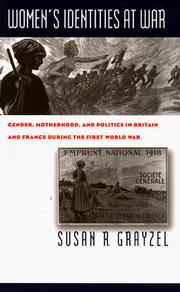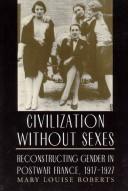| Listing 1 - 7 of 7 |
Sort by
|
Book
ISBN: 9782916385488 2916385487 Year: 2011 Publisher: [Saint-Cloud] : Soteca,
Abstract | Keywords | Export | Availability | Bookmark
 Loading...
Loading...Choose an application
- Reference Manager
- EndNote
- RefWorks (Direct export to RefWorks)
World War, 1914-1918 --- Women in war --- Women --- World War, 1914-1918 - Women - France --- Women in war - France
Book
ISBN: 274670515X 9782746705159 Year: 2004 Volume: 103 Publisher: Faubourg Saint-Antoine, France : Autrement,
Abstract | Keywords | Export | Availability | Bookmark
 Loading...
Loading...Choose an application
- Reference Manager
- EndNote
- RefWorks (Direct export to RefWorks)
Aux champs, dans les usines, dans les hôpitaux, les femmes ont répondu massivement dès 1914 à l'effort de guerre : c'est le travail, même bénévole, le quotidien du foyer à gérer seule, le soutien moral au soldat, avec l'aide des enfants embrigadés comme "graines de poilus"… Les femmes de la Grande Guerre, ont aussi subi dans les territoires du Nord, les douleurs de l'occupation. D'autres ont décidé de résister au patriotisme aveugle en s'opposant au militarisme et à la guerre, ou en dénonçant des conditions de travail pénibles, dangereuses et sous payées. En 1918, 800 000 veuves noircissent le paysage, mais le grand nombre de morts et de mutilés met une chape de plomb sur leur douleur et leurs difficultés de vie. On considère souvent que la Grande Guerre a marqué un tournant dans l'émancipation féminine. Ce livre montre effectivement comment cet événement majeur a bouleversé les rapports hommes/femmes, mais aussi comment, au moment de l'Armistice et dans les mois qui suivent, chaque sexe se plie très vite aux injonctions d'un ordre social. Les Danoises, Allemandes, Hollandaises, Russes, Tchèques, Américaines, Suédoises et Anglaises entre autres, obtiennent le droit de vote, mais les Françaises demeurent résolument exclues de la citoyenneté. Une nouvelle silhouette de femme émerge cependant de la Guerre: cheveux courts, jupes moins longues et corsets jetés aux orties.
World War, 1914-1918 --- Première guerre mondiale --- Women --- War work --- Femmes --- Participation des civils --- Première guerre mondiale --- World War, 1914-1918 - Women - France
Book
ISBN: 2234017483 9782234017481 Year: 1986 Volume: vol *19 Publisher: Paris Stock : Laurence Pernoud
Abstract | Keywords | Export | Availability | Bookmark
 Loading...
Loading...Choose an application
- Reference Manager
- EndNote
- RefWorks (Direct export to RefWorks)
World War, 1914-1918 --- Women --- History --- 20th century --- World War, 1914-1918 - Women - France. --- World War, 1914-1918 - France. --- Women - France - History - 20th century,
Book
ISBN: 9782251445106 2251445102 Year: 2014 Publisher: Paris : Les Belles lettres,
Abstract | Keywords | Export | Availability | Bookmark
 Loading...
Loading...Choose an application
- Reference Manager
- EndNote
- RefWorks (Direct export to RefWorks)
Histoire des répercussions de la Première Guerre mondiale sur les relations conjugales à travers l'étude des couples français et de leurs efforts pour garder le contact grâce aux échanges épistolaires. ©Electre 2015
Couples --- World War, 1914-1918 --- Première guerre mondiale --- History --- Social aspects --- Histoire --- Aspect social --- Married people --- Women --- Guerre mondiale (1914-1918) --- Couple --- Première guerre mondiale --- Married people - France - History - 20th century. --- Couples - France - History - 20th century. --- World War, 1914-1918 - Social aspects - France. --- World War, 1914-1918 - Women - France.

ISBN: 0807848107 9780807848104 Year: 1999 Publisher: Chapel Hill University of North Carolina press
Abstract | Keywords | Export | Availability | Bookmark
 Loading...
Loading...Choose an application
- Reference Manager
- EndNote
- RefWorks (Direct export to RefWorks)
World War, 1914-1918 --- Women --- Identity --- History --- European War, 1914-1918 --- First World War, 1914-1918 --- Great War, 1914-1918 --- World War 1, 1914-1918 --- World War I, 1914-1918 --- World War One, 1914-1918 --- WW I (World War, 1914-1918) --- WWI (World War, 1914-1918) --- History, Modern --- Human females --- Wimmin --- Woman --- Womon --- Womyn --- Females --- Human beings --- Femininity --- Female identity --- Feminine identity --- Identity (Psychology) --- World War, 1914-1918 - Women - Great Britain --- World War, 1914-1918 - Women - France --- Women - Identity --- Women - Great Britain - History - 20th century --- Women - France - History - 20th century

ISBN: 0226721221 0226721213 9780226721217 9780226721224 Year: 1994 Volume: *28 Publisher: Chicago, Ill. The University of Chicago Press
Abstract | Keywords | Export | Availability | Bookmark
 Loading...
Loading...Choose an application
- Reference Manager
- EndNote
- RefWorks (Direct export to RefWorks)
In sources as diverse as parliamentary records, newspaper articles, novels, medical texts, writings on sexology, and vocational literature, Roberts discovers a central question: how to come to terms with rapid economic, social, and cultural change and articulate a new order of social relationships. She examines the role of French trauma concerning the War in legislative efforts to ban propaganda for abortion and contraception, and explains anxieties about the decline of maternity by a crisis in gender relations that linked soldiery, virility, and paternity. In the raucous decade following World War I, newly blurred boundaries between male and female created fears among the French that theirs was becoming a civilization without sexes. This new gender confusion became a central metaphor for the War's impact on French culture and led to a marked increase in public debate concerning female identity and woman's proper role. Mary Louise Roberts examines how in these debates French society came to grips with the catastrophic horrors of the Great War. Through these debates, Roberts locates the seeds of actual change. She shows how the willingness to entertain, or simply the need to condemn, nontraditional gender roles created an indecisiveness over female identity that ultimately subverted even the most conservative efforts to return to traditional gender roles and irrevocably altered the social organization of gender in postwar France.
Sex role --- Women --- World War, 1914-1918 --- Rôle selon le sexe --- Femmes --- Première guerre mondiale --- History --- Social conditions. --- Social aspects --- Histoire --- Conditions sociales --- Aspect social --- vrouwengeschiedenis --- seksuele rolpatronen --- Frankrijk --- ro: foreword by --- CDL --- 305 --- History of France --- anno 1910-1919 --- anno 1920-1929 --- Rôle selon le sexe --- Première guerre mondiale --- Sex roles --- France --- Social conditions --- 20th century --- Sex role - France - History - 20th century. --- World War, 1914-1918 - Social aspects - France. --- World War, 1914-1918 - Women - France. --- European War, 1914-1918 --- First World War, 1914-1918 --- Great War, 1914-1918 --- World War 1, 1914-1918 --- World War I, 1914-1918 --- World War One, 1914-1918 --- WW I (World War, 1914-1918) --- WWI (World War, 1914-1918) --- History, Modern --- Gender role --- Sex (Psychology) --- Sex differences (Psychology) --- Social role --- Gender expression --- Sexism --- Gender roles --- Gendered role --- Gendered roles --- Role, Gender --- Role, Gendered --- Role, Sex --- Roles, Gender --- Roles, Gendered --- Roles, Sex --- Frankrijk.

ISBN: 1282070185 9786612070181 0226721272 9780226721279 9780226721217 0226721213 0226721221 9780226721224 0226721213 9780226721217 9781282070189 6612070188 Year: 1994 Publisher: Chicago University of Chicago Press
Abstract | Keywords | Export | Availability | Bookmark
 Loading...
Loading...Choose an application
- Reference Manager
- EndNote
- RefWorks (Direct export to RefWorks)
In the raucous decade following World War I, newly blurred boundaries between male and female created fears among the French that theirs was becoming a civilization without sexes. This new gender confusion became a central metaphor for the War's impact on French culture and led to a marked increase in public debate concerning female identity and woman's proper role. Mary Louise Roberts examines how in these debates French society came to grips with the catastrophic horrors of the Great War. In sources as diverse as parliamentary records, newspaper articles, novels, medical texts, writings on sexology, and vocational literature, Roberts discovers a central question: how to come to terms with rapid economic, social, and cultural change and articulate a new order of social relationships. She examines the role of French trauma concerning the War in legislative efforts to ban propaganda for abortion and contraception, and explains anxieties about the decline of maternity by a crisis in gender relations that linked soldiery, virility, and paternity. Through these debates, Roberts locates the seeds of actual change. She shows how the willingness to entertain, or simply the need to condemn, nontraditional gender roles created an indecisiveness over female identity that ultimately subverted even the most conservative efforts to return to traditional gender roles and irrevocably altered the social organization of gender in postwar France.
Sex role --- Women --- World War, 1914-1918 --- European War, 1914-1918 --- First World War, 1914-1918 --- Great War, 1914-1918 --- World War 1, 1914-1918 --- World War I, 1914-1918 --- World War One, 1914-1918 --- WW I (World War, 1914-1918) --- WWI (World War, 1914-1918) --- History, Modern --- Gender role --- Sex (Psychology) --- Sex differences (Psychology) --- Social role --- Gender expression --- Sexism --- History --- Social conditions. --- Social aspects --- Sex role - France - History - 20th century. --- Women - France - Social conditions. --- World War, 1914-1918 - Social aspects - France. --- World War, 1914-1918 - Women - France. --- Gender roles --- Gendered role --- Gendered roles --- Role, Gender --- Role, Gendered --- Role, Sex --- Roles, Gender --- Roles, Gendered --- Roles, Sex --- Sex roles --- gender, postwar, wartime, history, historical, wwi, world war, france, french, europe, european, 1900s, 20th century, reconstruction, roles, academic, scholarly, research, culture, cultural, parliament, primary source, newspaper, articles, novels, medical, sexology, vocational, literature, literary, women, woman, maternity, family, social studies.
| Listing 1 - 7 of 7 |
Sort by
|

 Search
Search Feedback
Feedback About UniCat
About UniCat  Help
Help News
News